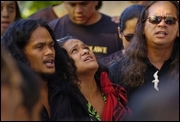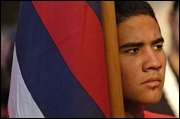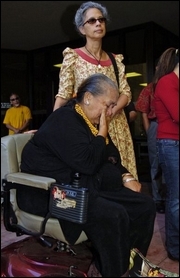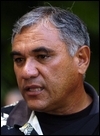Group defies artifacts order
Honolulu Advertiser
Wednesday, December 28, 2005
By Gordon Y.K. Pang and James Gonser
Advertiser Staff WriterThe leader of a Native Hawaiian organization yesterday was ordered jailed by U.S. District Judge David Ezra until the precise whereabouts of 83 priceless cultural artifacts are disclosed or the items are recovered.
Edward Halealoha Ayau, executive director of Hui Malama I Na Kupuna O Hawai'i Nei and other Hui Malama officials have said the items are buried in caves in Honokahua Gulch on the Kohala side of the Big Island. They maintain that providing specifics would violate their Native Hawaiian religious beliefs.
In a packed and emotionally charged courtroom, Ayau was found by Ezra to be in contempt of court and ordered incarcerated at the Federal Detention Center near Honolulu International Airport until he discloses the objects' locations, someone else discloses the locations or the objects are located and taken back to Bishop Museum.
Hui Malama borrowed the objects from the museum in 2000 and never returned them. The group said the items, known as the Forbes Cave collection, have been placed in the vicinity of where they were taken by Westerners in 1905.
Two other Native Hawaiian organizations, Na Lei Alii Kawananakoa and the Royal Hawaiian Academy of Traditional Arts, sued the museum and Hui Malama to force their return. Hui Malama officials have refused and said it would be sacrilegious to return them or participate in their removal.
William Aila, a Hui Malama board member, predicted that Ayau's imprisonment will spur supporters to express their unhappiness with the action and thereby prove that they represent the views of a majority of Native Hawaiians.
"What you will see in the upcoming days is more Hawaiian groups coming out in support of Hui Malama and the cultural position that you're not supposed to disturb iwi kupuna (bones) and their moepu (burial artifacts)," Aila said.
Aila is one of three Hui Malama board members Ezra said also are in contempt. The judge said he would deal with their cases later, noting that it was Ayau who was Hui Malama's leader and clearly had the most knowledge about the objects' whereabouts. The others are Pualani Kanaka'ole Kanahele and Antoinette Freitas.
Kahu Charles Kauluwehi Maxwell Sr., president of the organization, also had been ordered to appear yesterday but was in the hospital with a heart ailment and unable to attend the proceeding.
Aila noted that more than 200 Hui Malama supporters, led by the 'Ilio'ulaokalani Coalition and faculty from the University of Hawai'i at Manoa's Center for Hawaiian Studies, gathered at the steps of the Federal Building yesterday and packed Ezra's courtroom.
"The judge, in his decision, is going to cause Hawaiians to come to grips with their cultural responsibilities," Aila said.
Hui Malama leaders are talking about possible vigils and demonstrations but definitive plans have not been set, he said.
Maxwell, from his bed at Maui Hospital, called yesterday "a black day for the Native Hawaiian people."
Sherry Broder, an attorney for Hui Malama opponents, said she was disappointed that Ayau and his group did not do as the judge had asked. "We're quite worried," she said, noting that recent admissions by Hui Malama about the artifacts going into two caves, rather than one as originally believed, and the possibility that one of the caves was not sealed securely, troubles her clients.
Ezra said yesterday Ñ and during a hearing last week Ñ that he was trying to be sensitive to Hui Malama's religious convictions and stated he was a longtime student of Hawaiian culture.
Maxwell called Ezra's claims "ridiculous."
"How can a haole judge who has not worked with us, who does not know the spiritual and cultural things, throw a comment like that," he said. "That is totally uncalled for."
But Cy Kamuela Harris, a member of the Kekumano 'Ohana which is also a claimant to the objects, said Hui Malama officials are wrong in proclaiming their views are right while dismissing those of others.
"Not all knowledge comes from one school," Harris said.
Harris, a follower of the Temple of Lono, said his cultural and religious teachers have taught him that the objects are artifacts that should be displayed publicly and not sealed in a cave.
Harris said it was Hui Malama's leaders who came up with the notion of repatriation of artifacts. "They're making it all up as they go along," he said.
Harris' views echoed those of Ezra's, who said at one point that Hui Malama "does not have a corner on the Native Hawaiian religion."
The emotions in Ezra's courtroom were so charged that at one point, Kanahele stood up from where she sat in the audience, said to those nearby, "I'm not going to sit and listen to this crap," and began to walk out of the gallery.
When others began to follow her, Ezra said he was almost finished and asked that the audience wait until he was done. When about 50 people continued toward the exit, he told the approximately 20 federal marshals and state sheriffs to clear the courtroom of all present except members of the media and parties to the lawsuit.
A man from the audience then shouted something in Hawaiian and Ezra immediately asked that he be detained and held in contempt. The man, identified by Hui Malama supporters as Kihei Nahale'a of the Big Island, was later sentenced by Ezra to five days in jail.
Ayau, in a black dress shirt, black pants and black shoes, repeatedly turned his chair sideways and looked away from Ezra as he spoke. He did, however, look at the judge when spoken to directly.
Asked by Ezra if he was ready to go to jail, Ayau said: "I would be honored."
Ezra repeatedly said that he empathized with the views of Hui Malama's members but that their lack of cooperation with what now amounted to the wishes of the 9th U.S. Circuit Court of Appeals left him no choice.
"Your clients are deserving of their religious beliefs but no more so than the religious beliefs of others," Ezra told Alan Murakami, an attorney for the Native Hawaiian Legal Corp., which is representing Hui Malama.
Ezra said he is ordering U.S. Magistrate Kevin Chang to assist him as a designated court master, although it was unclear at the end of yesterday exactly what his duties will be.
Ayau was escorted out of the courtroom without handcuffs.
Outside the courtroom, Hui Malama supporters continued to chant and pray.
But at least one person in the crowd was opposed to Hui Malama's views and believes there are many others like her.
Nanette Napoleon of Kailua said it is "just plain silly" for Hui Malama supporters to suggest there is only one interpretation of what constitutes the Native Hawaiian religion.
"They set these rigid, unyielding, dogmatic rules that they expect everybody else in the Hawaiian community to follow," she said. "And they have absolutely no tolerance for any other point of view and to me that is so un-Hawaiian and so un-pono it makes my heart break."
Reach Gordon Y.K. Pang at gpang@honoluluadvertiser.com.
© COPYRIGHT 2005 The Honolulu Advertiser, a division of Gannett Co. Inc.
Original article URL: http://the.honoluluadvertiser.com/article/2005/Dec/28/ln/FP512280345.html/?print=on



